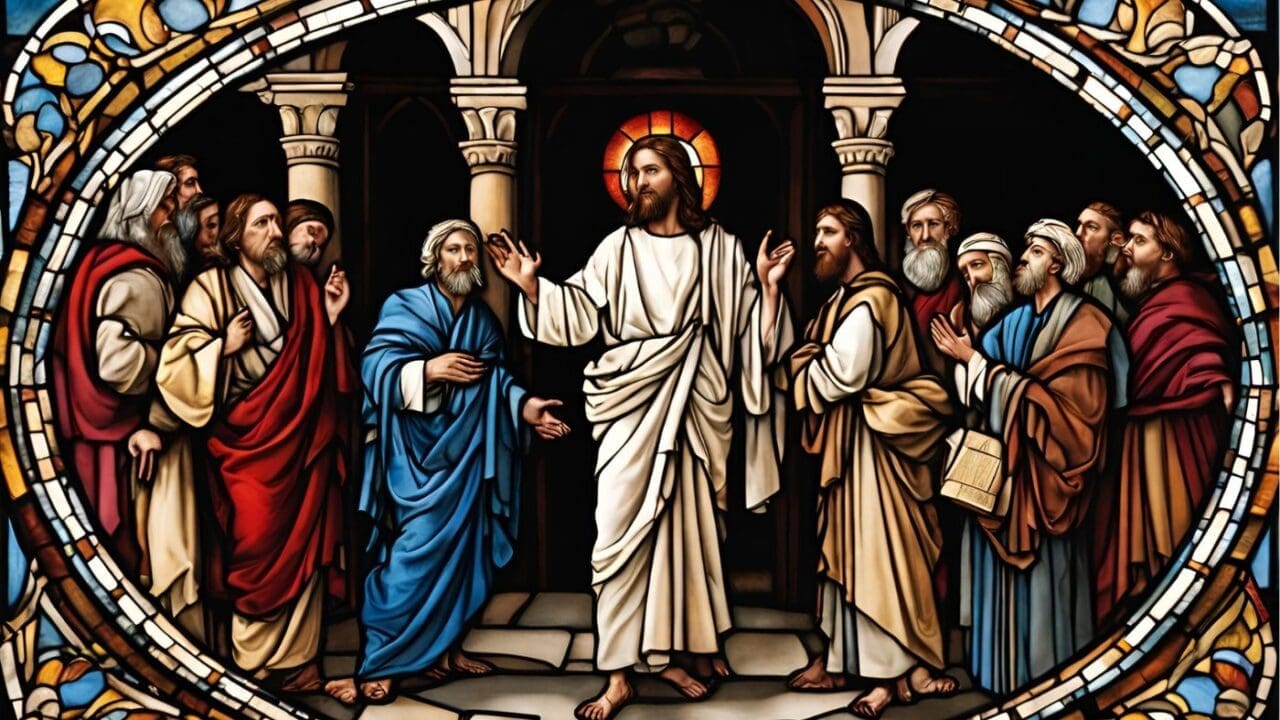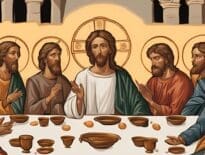the reading
Jesus said, “Those who eat my flesh and drink my blood abide in me, and I in them. Just as the living Father sent me, and I live because of the Father, so whoever eats me will live because of me. This is the bread that came down from heaven, not like that which your ancestors ate, and they died. But the one who eats this bread will live forever.” He said these things while he was teaching in the synagogue at Capernaum.
When many of his disciples heard it, they said, “This teaching is difficult; who can accept it?” But Jesus, being aware that his disciples were complaining about it, said to them, “Does this offend you? Then what if you were to see the Son of Man ascending to where he was before? It is the spirit that gives life; the flesh is useless. The words that I have spoken to you are spirit and life. But among you there are some who do not believe.” For Jesus knew from the first who were the ones that did not believe, and who was the one that would betray him. And he said, “For this reason I have told you that no one can come to me unless it is granted by the Father.”
Because of this many of his disciples turned back and no longer went about with him. So Jesus asked the twelve, “Do you also wish to go away?” Simon Peter answered him, “Lord, to whom can we go? You have the words of eternal life. We have come to believe and know that you are the Holy One of God.”
the sermon
We’ve got a problem.
It’s you.
And it’s me.
It’s all of us.
You see, the reality of our situation is that church isn’t compatible with our modern American culture. Following Christ is actually counter-cultural. Because of that, we’re just wired to struggle with the Gospel and how to live it.
And even when we do “figure it out,” it’s so incredibly different from the way the world around us tells us to live that we’re ultimately going to struggle with the balance between the life we live and the life we want to live as followers of Christ.
It’s hard. There’s no way around it.
And that’s exactly the scene we get in today’s Gospel reading from John.
what’s happening in john 6:56-69
It starts with Jesus teaching his disciples in the synagogue about eating His flesh and drinking His blood. And I’ll just say that I really appreciate Cannon Ernie’s perspectives over the last couple of weeks on eating and the bread.
But I get it. This kind of teaching can be difficult to understand, as I’m sure it was for the disciples who were there that day.
Jesus sometimes talked about ideas that were really over their heads, and frequently had to back it up to break down and explain what He was trying to tell them.
And this would have been one of those moments. Scratching their heads, they started saying, “This teaching is difficult; who can accept it?”
We’ve all been there, right?
I imagine some of the disciples listening to this and thinking, “NASTY! There’s NO WAY that I’m going to eat his flesh and drink his blood! That’s DISGUSTING!”
It’s easier for us to see this now, but that’s not what Jesus was really talking about.
For them though, many of them wrestled with all of it, and ultimately got to a point where they just felt like they couldn’t follow this guy anymore.
And I think Jesus may have gotten a little snippy with them here! Too often, I think we read Jesus’s words using our deepest and calmest King James voice, “Doth this offendeth thou? What and if ye shall see the Son of man ascendeth…”
But listen to how Jesus handles this. It has a little bit of that table-flipping Jesus fire in it…
“Does this offend you? Then what if you were to see the Son of Man ascending to where he was before? It is the spirit that gives life; the flesh is useless. The words that I have spoken to you are spirit and life. But among you [insert dramatic pause] there are some who do not believe.”
He kinda lays into them a little bit. And He certainly calls out the ones who simply can’t reconcile what it means to be a disciple.
So, as the scripture tells us, many of them were all like “forget this” and left.
It was simply too much for them to want to deal with.
Which I find interesting.
They were there listening to Jesus in the synagogue because they believed something about Him already. And these weren’t first-time visitors either. The text tells us that they were disciples. They believed enough about Jesus to commit to sitting under Him and studying and learning more about the Kingdom of God, which He’s been proving that He’s kind of a big deal in.
I don’t know exactly what went through the heads of those who left. But it’s clear that they either didn’t truly believe or that they weren’t willing to commit themselves to Jesus and what He was trying to share with them.
So they left.
Then, Jesus turns to the twelve.
“Do you also wish to go away?”
But He already knew the answer to that. The text even tells us a little earlier that He already knew who were the ones who didn’t believe. So it’s obvious that He knew who did too.
It’s funny how God does this throughout the scriptures. It’s like God approaching Adam and Eve in the Garden, asking where are you? As if He didn’t already know.
I think that sometimes God asks us questions that He already knows the answer to, because we need to hear our own response. It forces us to recognize and state some Truth.
So Jesus asked them. And I imagine Peter looking at the others to see if anyone else wanted to respond. Then he spoke not only for himself, but for the group.
I’ll get to that response in a minute. But first…
our problem
I kicked this off by pointing out that the church isn’t compatible with modern American culture.
That’s because everything we see and hear and feel runs against the grain of what Christ calls us to.
It’s a problem of self. It’s a problem of putting ourselves at the center of the Universe.
And this isn’t just a recent trend. It’s something that’s been building for a long time.
Believe it or not, there was a time when most people understood their identity from the Biblical perspective, beginning with the basic premise that we are human beings created in the image of a loving God. Then everything else about us stems from that starting point.
Then in the 1600’s, along comes a man named René Descartes, a scientist, mathematician, and philosopher. Through systematic doubt, he broke down everything until he got to the point of one thing he couldn’t deny… that he was a “thinking substance.” And that’s where he got to his famous statement, “I think, therefore I am.”
He then continued to rebuild the world from that point, including developing his proofs for the existence of God.
But, the problem with that is that even his proofs for the existence of God started in “self.”
This is considered the beginning of modern thinking.
And we could spend a lot of time discussing how thinking has continued to evolve from there. But suffice it to say that all of this self-realized identity and thinking has become how we filter everything.
This is why Jesus’s teaching gets so difficult for us.
Think about those disciples. I imagine the murmuring and conversations on their way out the door went something like…
- “This is too hard for me to understand.”
- “This makes me uncomfortable.”
- “What will people think of me when they hear that I’m into this?”
Wait… is this the response the disciples might have had, or is that how we might respond?
to whom can we go?
And that’s why I love Peter’s response.
“Lord, to whom can we go?”
Even that first word, Lord. In the original Greek, it’s Kyrie, which means lord or master; he to whom a person or thing belongs, about which he has the power of deciding.
Peter, in his response, begins with recognizing his place in relation to Jesus as the source of his own identity.
Then he says,
“To whom can we go? You have the words of eternal life. We have come to believe and know that you are the Holy One of God.”
I love this response!
In it, Peter puts away any hint of a self-focused definition of who Jesus is and how he uses that to define his own life and identity.
It’s incredible, really.
Coming from Peter, likely one of the most knuckle-headed people in the New Testament. I know some have described him as loud-mouthed, impetuous, lacking humility, and the list goes on.
At the same time, he drops some of the most brilliant perspectives out there.
“To whom can we go? You have the words of eternal life.”
When all of the others basically responded, “This is too hard for me,” Simon Peter responds with, “You are the source of everything, Lord!”
It doesn’t matter what the rest of this world thinks.
It doesn’t matter how hard this might be.
It doesn’t matter how uncomfortable it’ll be at times.
None of it matters, except YOU, LORD!
final thoughts
I don’t know about you, but that’s the place where I want to be.
Listen, life is hard. Especially when we try to work out our faith in a world around us that’s so self-absorbed and focused that looking outside of ourselves to find identity and purpose and life makes us look like the oddballs.
I’ve been down the path of trying to find and figure all of that out on my own. And I’ve only run into dead-ends and empty philosophies about life. It wasn’t until I truly decided to give Jesus a chance and made Him the center of my life and all of my being that I started finding a fulfillment that simply didn’t exist anywhere else.
Like Peter, I recognized, “You (Lord) have the words of eternal life.”
Where else can we go?





0 Comments